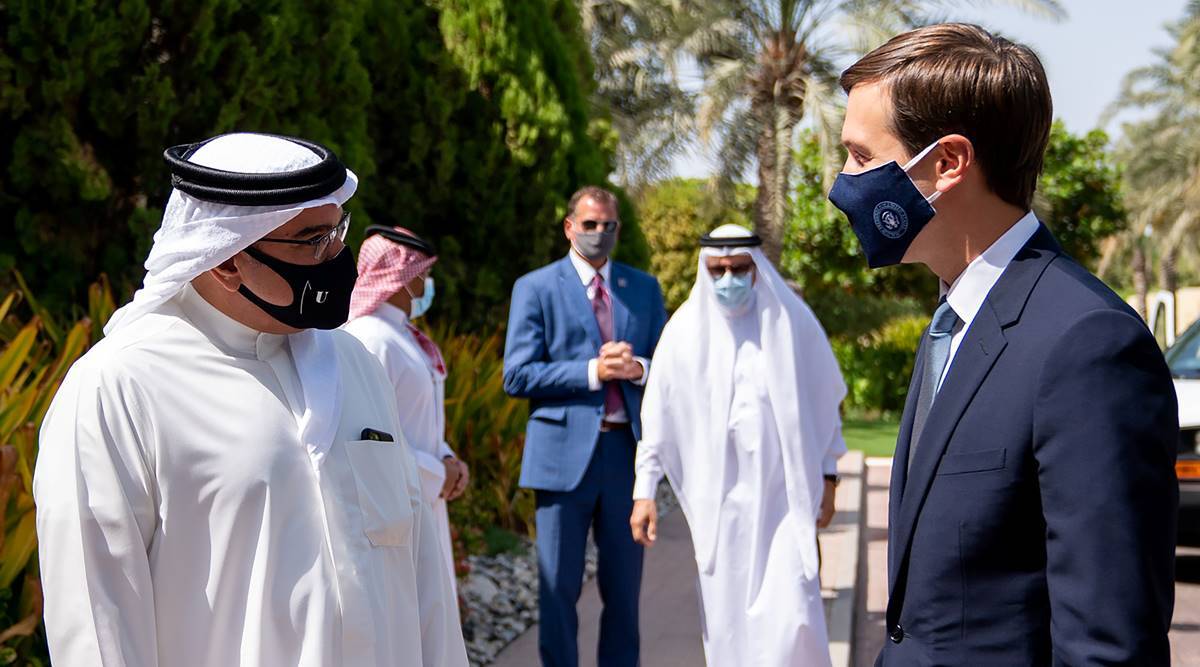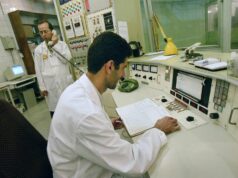Bahrain becomes latest Arab nation to recognise Israel following UAE

Senior White House adviser Jared Kushner (right) says the agreement is the second Israel has reached with an Arab country in 30 days.(Bahrain News Agency/ Reuters)
Bahrain has become the latest Arab nation to agree to normalise ties with Israel as part of a broader diplomatic push by US President Donald Trump and his administration to fully integrate the Jewish state into the Middle East.
- The deal will normalise diplomatic and security relations between the two countries
- It comes after the establishment of full relations between Israel and the UAE
- The agreement will likely be seen as a further setback to the Palestinians
The agreement to normalise ties with Israel marks a “new era of peace”, Israeli Prime Minister Benjamin Netanyahu said after Mr Trump announced the new deal.
“For many long years, we invested in peace, and now peace will invest in us, will bring about truly major investments in Israel’s economy — and that is very important,” Mr Netanyahu said in a video statement on Friday (local time).
The announcement followed a three-way phonecall Mr Trump had with Mr Netanyahu and Bahrain’s King Hamad bin Isa Al Khalifa.
The three leaders also issued a brief six-paragraph joint statement, attesting to the deal.
Mr Trump’s son-in-law and senior adviser Jared Kushner noted that the agreement was the second Israel had reached with an Arab country in 30 days after having made peace with only two Arab nations — Egypt and Jordan — in 72 years of its independence.
The announcement on the 19th anniversary of the September 11, 2001 terrorist attacks came less than a week before Mr Trump hosts a White House ceremony to mark the establishment of full relations between Israel and the United Arab Emirates.
Bahrain’s Foreign Minister is set to attend the event.
“There’s no more powerful response to the hatred that spawned 9/11 than this agreement,” Mr Trump told reporters at the White House.
It represents another diplomatic win for Mr Trump less than two months before the the presidential election and an opportunity to shore up support among pro-Israel evangelical Christians.
Just last week, he announced agreements in principle for Kosovo to recognise Israel and for Serbia to move its embassy from Tel Aviv to Jerusalem.
“This is a historic breakthrough to further peace in the Middle East,” Mr Trump, Mr Netanyahu and King Hamad said in the statement.
“Opening direct dialogue and ties between these two dynamic societies and advanced economies will continue the positive transformation of the Middle East and increase stability, security, and prosperity in the region.”
‘Enduring resolution to the Israeli-Palestinian conflict’
Bahrain, along with Saudi Arabia, had already dropped a prohibition on Israeli flights using its airspace.
Saudi acquiescence to the agreements had been considered key to the deals.
Like the UAE agreement, Friday’s Bahrain-Israel deal will normalise diplomatic, commercial, security and other relations between the two countries.
Mr Netanyahu welcomed the agreement and thanked Mr Trump.
“It took us 26 years between the second peace agreement with an Arab country and the third, but only 29 days between the third and the fourth, and there will be more,” he said, referring to the 1994 peace treaty with Jordan and the more recent agreements.
The agreement will likely be seen as a further setback to the Palestinians who tried unsuccessfully to have the Arab League condemn normalisation with Israel until they have secured an independent state.
That was one of the few cards still held by Palestinians in negotiations as peace talks remain stalled.
The joint statement made passing mention of the Palestinians, saying the parties would continue efforts “to achieve a just, comprehensive, and enduring resolution to the Israeli-Palestinian conflict to enable the Palestinian people to realise their full potential”.
The agreement makes Bahrain the fourth Arab country, after Egypt, Jordan and the UAE, to have full diplomatic ties with Israel.
Other nations believed to be on the cusp of fully recognising Israel include Oman and Sudan.
While tacitly blessing the deals Saudi Arabia, the regional power player, is not expected to move as quickly.
The Israeli-UAE deal required Israel to halt its contentious plan to annex occupied West Bank land sought by the Palestinians.
Telephone calls soon began between the nations as they continue to discuss other deals, including direct flights.



